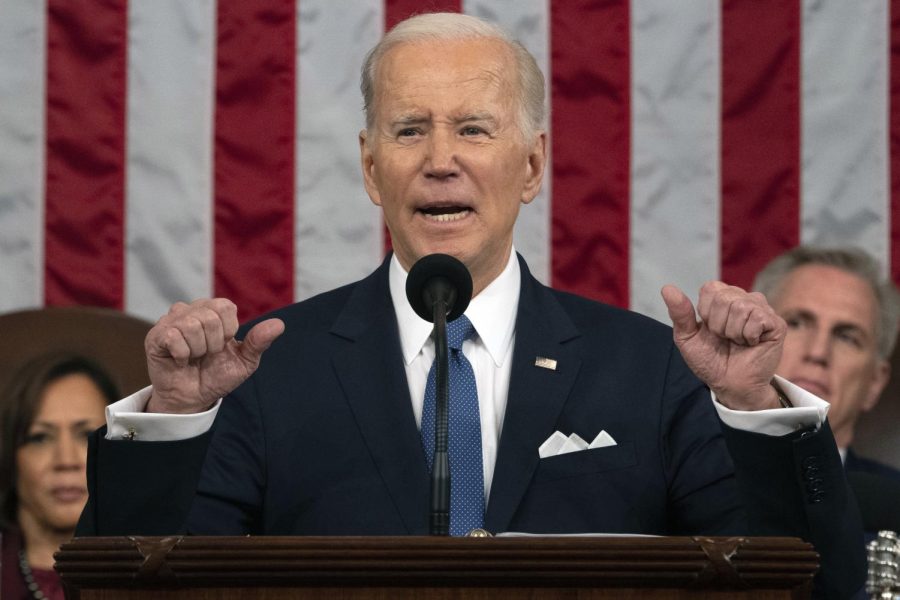State of the Union Sets the 2024 Stage
The 2024 election is more than 18 months away, but the campaigns are already underway. President Biden previewed the message he’ll run on in his all-but-certain reelection campaign during his State of the Union address on Feb. 7. Gov. Sarah Huckabee Sanders’ official Republican response previewed the onslaught of GOP attacks on Biden that will come as their contested primary heats up. Collectively, these speeches give us the clearest sign yet of how each party plans to win in 2024.
In many ways, the State of the Union address was a relentlessly ordinary Biden speech. He wheeled out the same tired adages and stories he repeats every time he takes the podium. He recounted his favorite dinner-time conversations with his Dad about the meaning of work and reminded us that “America can be defined in one word: possibilities.” The message might be true, but Biden’s speechwriters would be well-served to find him some new material. There was one notable addition to Biden’s arsenal, though. Twelve times, he called on Congress and the American people to “finish the job.” It was an unmistakable test drive of his reelection message. Betting on a soft economic landing, Biden plans to run a “Morning in America” style campaign in 2024, emulating Ronald Reagan’s cheery rhetoric of an America on the rise. President Biden tried desperately to make the midterms anything but a referendum on his performance. In 2024, he’ll do just the opposite. To be fair, he might not have many other options. Perhaps the most striking thing about Biden’s speech was the total lack of vision. He veered aimlessly from one spending proposal to another, rather casually advocating for an eye-popping increase in the size and scope of government. There was little in the way of a unifying theme, and nothing resembling an acknowledgment of fiscal reality. He asked for a clean increase in the debt ceiling, refusing to propose even modest spending cuts in response to our $31 trillion national debt. And he promised to veto any bill making changes to Social Security or Medicare benefits even though the two programs are projected to spend $112 trillion more than they take in over the next 30 years, according to the Peter G. Peterson Foundation. It’s foolish to deny the coming fiscal crisis. But Biden is happy to do so—he’ll look to spend recklessly for the next two years to juice his reelection chances, hoping that our fiscal reckoning won’t come earlier than expected. At 80 years old, the strategy makes some sense—he won’t be around to see the consequences of his inaction.
Gov. Sanders of Arkansas delivered the official Republican response to the speech. It was a welcome departure from Biden’s oratorical stylings—her tone was measured and her demeanor composed. Rather surprising, though, was the degree to which Sanders and Biden simply talked past one another. Yes, Gov. Sanders took on Biden’s spending agenda, casting herself and Republicans as advocates for liberty and limited government. But the lion’s share of her speech was dedicated to cultural issues. Repeatedly, she attacked the “woke” left for turning their back on core American principles of equality and equal opportunity with their rhetoric of racial essentialism. Sanders spent more time talking about education than any other issue. She chided the left for ignoring parents and pushing divisive ideologies to young students while previewing her own education plan, which would significantly raise teacher salaries and supercharge parents’ ability to make educational decisions for their own children. She devoted significant time to immigration, casting the current crisis at the border and the fentanyl epidemic in our cities as products of the Biden administration’s soft immigration policies. And she made a strong generational argument, saying that the unique challenges of our time necessitate a new generation of American political leaders.
It’s early—really early—to be making predictions about 2024. But at the outset, it seems that the campaign might be more about which issues the American people care about than any specific set of policies. Will they be pleased with the Biden administration’s actions on climate change, infrastructure, and manufacturing and re-elect him for a second term? Or will they be more concerned with education, immigration, and the Culture Wars? We know what type of race Biden will run—he simply lacks the stamina and the political talent to run anything but a “Rose Garden” campaign. There are more questions on the Republican side, and they begin with the nominee. Anybody but Donald Trump will be well-positioned to make Joe Biden’s age a central issue—and, relatedly, his political anchor of a Vice President. Beyond that, it’s murkier. A culture warrior like Ron DeSantis or a social conservative like Mike Pence will follow Sanders’ playbook and focus on education and “woke” excesses. Candidates with foreign policy experience like Mike Pompeo and Nikki Haley might place competition with China at the center of their campaigns. And of course, a Trump campaign will focus on one thing alone: the candidate’s ego. One thing, though, is certain: the next race for the White House is already underway.



